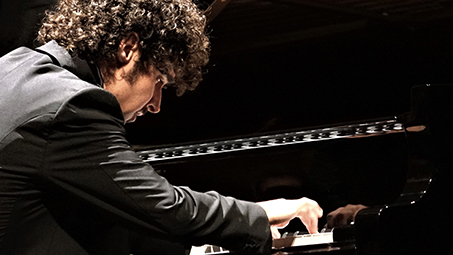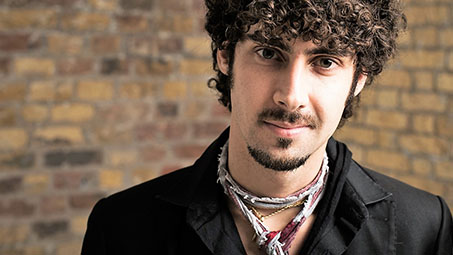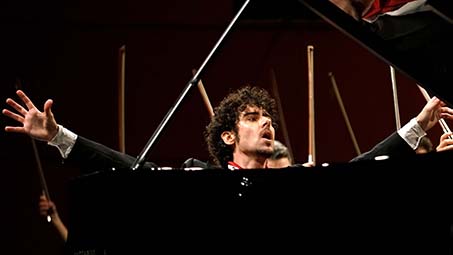The brilliant Italian pianist Federico Colli returns to our stage this month! We catch up with him ahead of his performance on Friday 24 March…

LJ: How has your career progressed since your debut at Turner Sims in 2015, and what would you say to your younger self, looking back on how much you’ve developed through the years?
FEDERICO: Actually, I must say that I have developed a lot. So, 2015 when I made my debut at Turner Sims, I was a fresh winner of the Leeds Piano Competition, so I was at the beginning, let’s say, of my professional career. Nowadays, I can say that I’m very happy to have a strong management company and I have a super beautiful relationship with all the company and my managers. It’s very important to have this kind of relationship to establish a proper career, to trust people in the business and artistic process. I have a strong label, Chandos and in 2017 I started to make some long-term projects for some Bach, Mozart. Some exciting projects are coming up during the next few years.
I had the opportunity to share the stage with great orchestras all over the world. I played from South America, Brazil, to far-east and Japan, South Korea. I made a lot of chamber music. It is very important, with chamber music, for a pianist just to develop the ears, and to follow the line, to understand the melodic line in another way, to phrasing in another way and maybe in a more beautiful way following a different part of the strings – those kinds of things.
I grew up humbly, thanks to some meetings and contacts in my life with some life-changing experiences, meeting people and developing understandings from the experiences of other people. The thing that I’d say to the younger Federico is to just be patient.

LJ: Your music-making has been described as ‘miraculous and multidimensional’. How do you transform such classical pieces of work into ones with contrasting dynamics and feelings?
FEDERICO: That’s a very interesting and challenging question. It is a matter of the interpretation process, so the artist process. I think the most important thing is to develop stories and images behind a piece of classical music. I mean, every piece, almost every piece of classical music can be considered as programme music, so we can find and imagine a story behind the notes.
I spend a lot of time researching and studying the biography of the composer and the social, cultural, artistic atmosphere where the composer lived and used to write the compositions. All these kinds of things, studying the social and cultural atmosphere and the biography, reading the letters and diaries of the composers, seeing some pictures of the period, reading some novels of the period – I mean, all of these ingredients are important to develop in my mind, certain images and certain stories. So the stories that I can see behind The Fantasy by Mozart are not the same images that I can see behind a sonata by Prokofiev, because we are talking about two different cultural and artistic and social worlds – universes – but these stories are important to develop sound, to develop phrasing and overall to develop an interpretation.
So, not looking at the notes or material aspects, but trying to emerge myself into a world, into a universe, an artistic universe, and thanks to this research, maybe I can find these specific stories, these specific images of a specific composer, and then start all the very long and challenging and difficult processes to realise all of these ideas, all these images, to practically realise, so how can I show an image thanks to the sound, but that’s another story.

LJ: What is your most memorable concert experience and why?
FEDERICO: I love to say always the next one, but if I have to remember, I have many emotional concerts in my mind, for giving me the chance to grow up as an artist and as a human being. I remember, for example, my London debut, my London Orchestra debut in the Barbican with the BBC Symphony Orchestra, Sakari Oramo and Rachmaninov’s Third Concerto.
LJ: You’re performing Prokofiev’s Peter and the Wolf, a symphonic fairy tale for children that was originally played by an orchestra. How do you differentiate between characters in the story as a soloist using just one instrument?
FEDERICO: It is important to find a characteristic and a specific sound for every single character, using the virtuosity of the sound, using all the ingredients and the materials that the pianist has for example, all the pedals. The left pedal can deem the sound, or the right pedal can give us more symphonic sound, or for example, playing the second piece of the suite, we must play in a very détaché way, so very sparkling and with a lot of rhythm and clarity, just to follow this onomatopoeia of this bird singing.
Or, for example, playing the grandpa, a very sad and angry grandpa speaking in a lower voice, so we are in the lower part of the keyboard. We need to find this dark sound so maybe using more right pedal just to have this not clarity, the opposite of what I was telling about the bird so, this dark and old song coming from a cave, something not real coming from a cave, coming from inside us, so totally not clear.
The sound is one of the most demanding things in music, not just in piano, but in music and it’s of course a process, and this process comes from an idea, so first of all I have the idea of the sound, as I was saying before, and then the realisation, manifestation of this idea.
LJ: What are you most looking forward to about coming back to perform at Turner Sims?
FEDERICO: Well, I love Turner Sims, I love Southampton, I always come back with a great joy. I especially love the acoustics of the hall, which is very beautiful for a solo recital. It’s very comfortable and also it’s not extremely big, the hall, so I can enjoy the intimate atmosphere of the hall, and I remember that the intimacy was very good. Last time, I enjoyed it a lot playing in Turner Sims, so I’m very much looking forward to coming back and to enjoy it again – great space, the people there, the audience, and of course the great piano.
Book your ticket to see Federico Colli on Friday 24 March here
Comments are closed, but trackbacks and pingbacks are open.